Analyzing Global Business Challenges and Exploiting Opportunities
VerifiedAdded on 2019/12/03
|8
|1827
|163
Report
AI Summary
This report delves into the challenges global businesses encounter when expanding into international markets. It begins by highlighting the difficulties faced by McDonald's and Samsung, using them as case studies to illustrate real-world problems. The core of the report focuses on a PESTLE analysis (Political, Economic, Social, Technological, Legal, and Environmental factors) as a strategic tool for understanding and addressing these challenges. The report examines how each PESTLE factor impacts global business operations, from political regulations and economic fluctuations to cultural preferences, technological advancements, legal frameworks, and environmental considerations. It emphasizes the need for businesses to adapt their strategies based on these factors to successfully exploit international opportunities. The report concludes that businesses must consider these factors and adapt their strategies for effective performance in international markets.
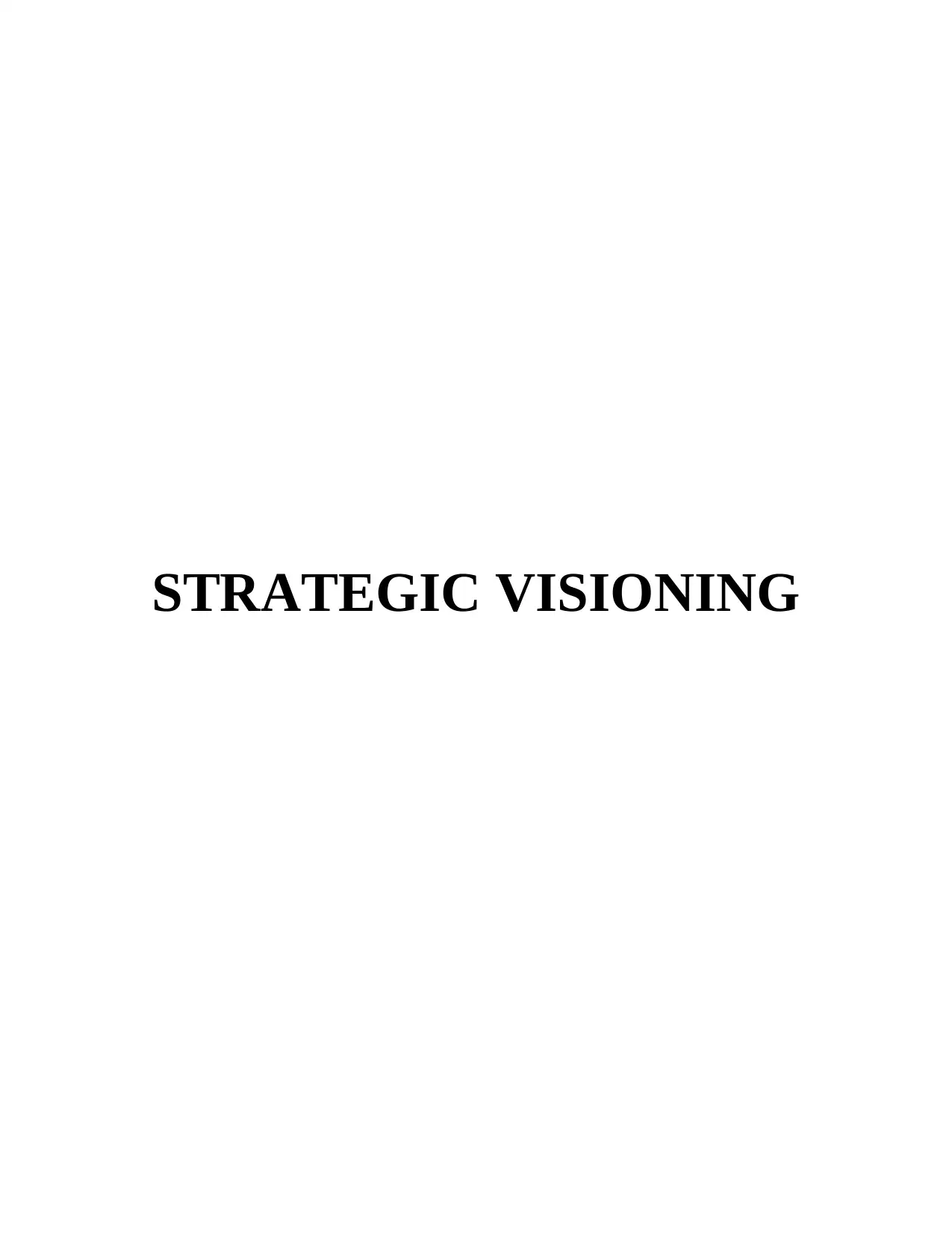
STRATEGIC VISIONING
Paraphrase This Document
Need a fresh take? Get an instant paraphrase of this document with our AI Paraphraser
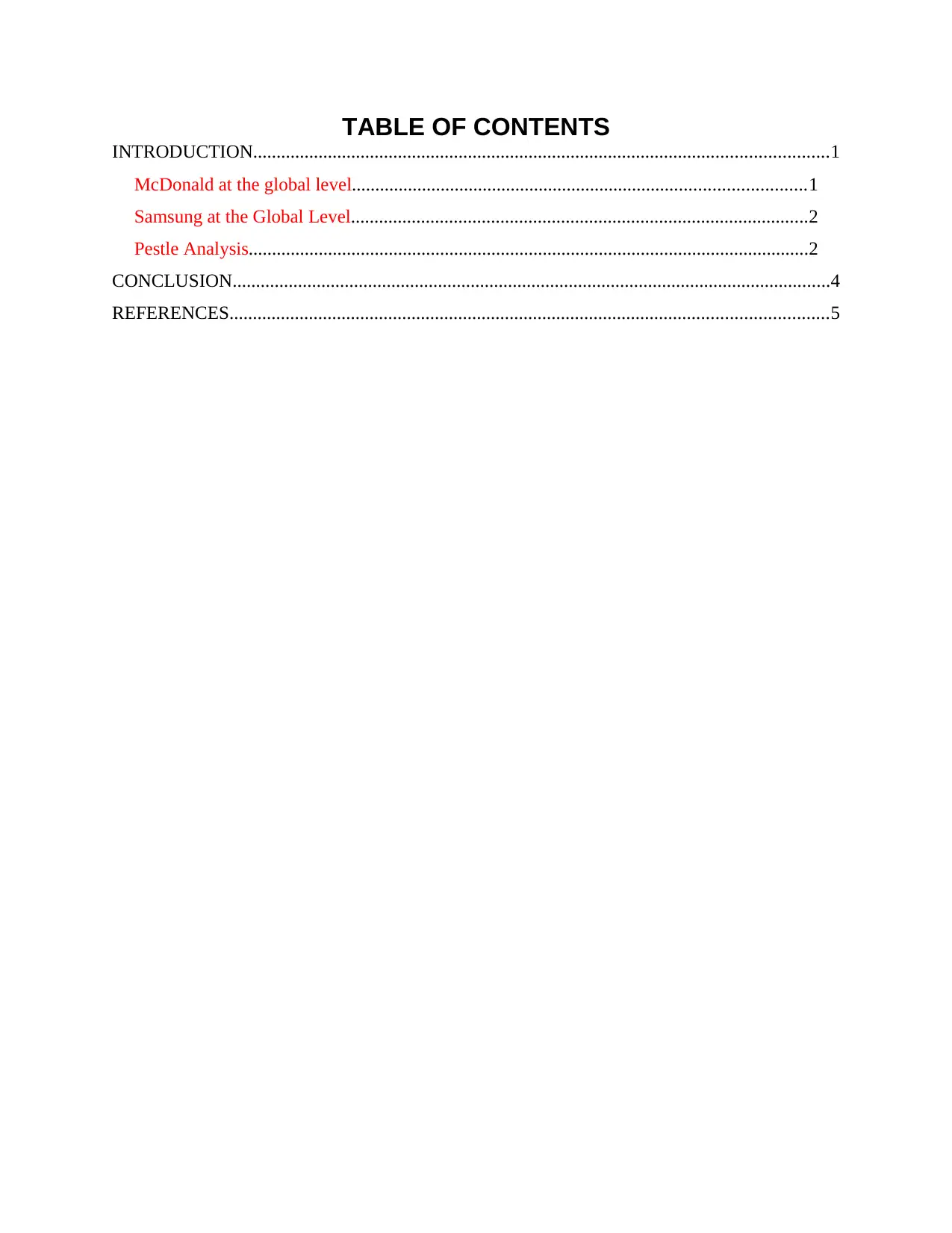
TABLE OF CONTENTS
INTRODUCTION...........................................................................................................................1
McDonald at the global level.................................................................................................1
Samsung at the Global Level..................................................................................................2
Pestle Analysis........................................................................................................................2
CONCLUSION................................................................................................................................4
REFERENCES................................................................................................................................5
INTRODUCTION...........................................................................................................................1
McDonald at the global level.................................................................................................1
Samsung at the Global Level..................................................................................................2
Pestle Analysis........................................................................................................................2
CONCLUSION................................................................................................................................4
REFERENCES................................................................................................................................5
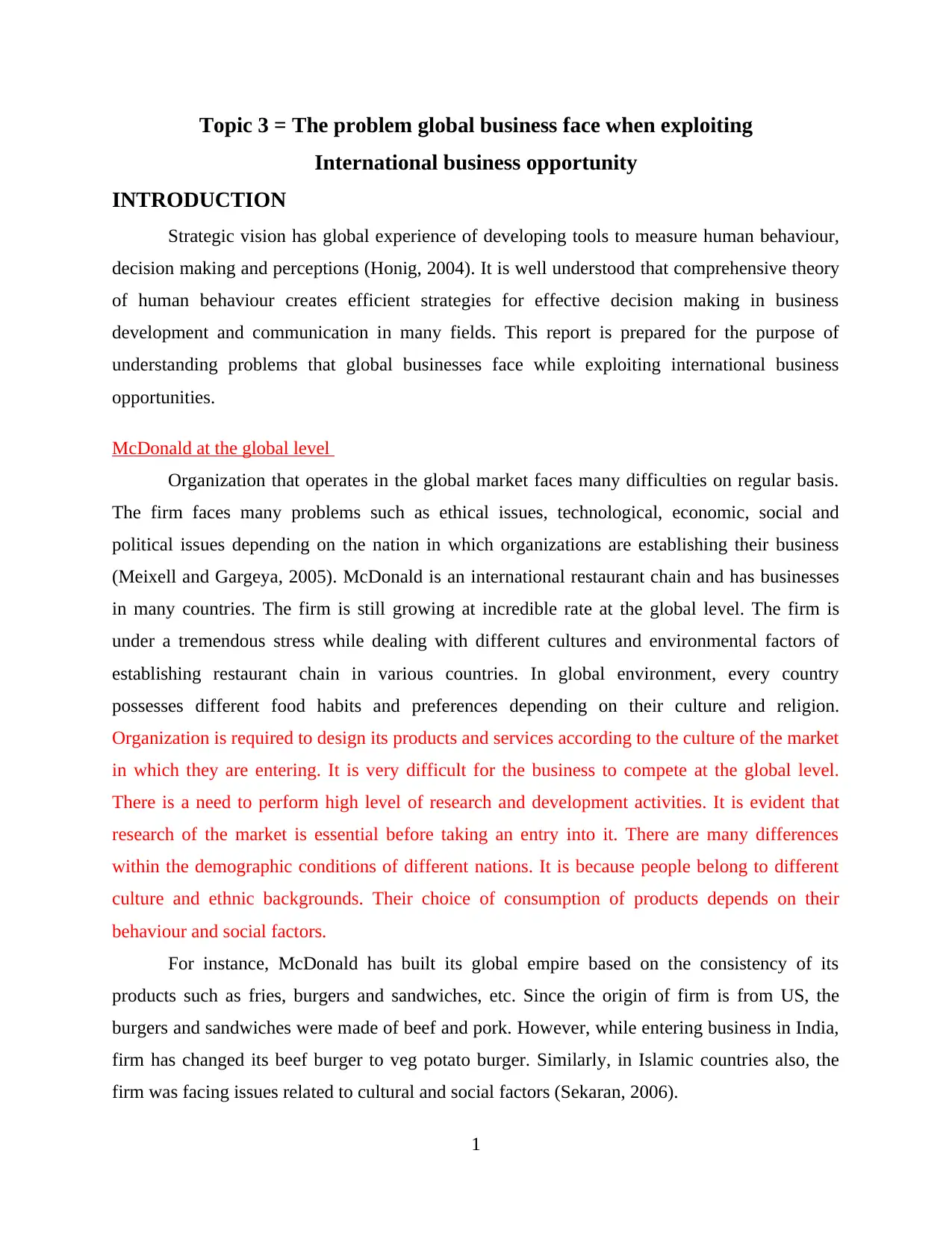
Topic 3 = The problem global business face when exploiting
International business opportunity
INTRODUCTION
Strategic vision has global experience of developing tools to measure human behaviour,
decision making and perceptions (Honig, 2004). It is well understood that comprehensive theory
of human behaviour creates efficient strategies for effective decision making in business
development and communication in many fields. This report is prepared for the purpose of
understanding problems that global businesses face while exploiting international business
opportunities.
McDonald at the global level
Organization that operates in the global market faces many difficulties on regular basis.
The firm faces many problems such as ethical issues, technological, economic, social and
political issues depending on the nation in which organizations are establishing their business
(Meixell and Gargeya, 2005). McDonald is an international restaurant chain and has businesses
in many countries. The firm is still growing at incredible rate at the global level. The firm is
under a tremendous stress while dealing with different cultures and environmental factors of
establishing restaurant chain in various countries. In global environment, every country
possesses different food habits and preferences depending on their culture and religion.
Organization is required to design its products and services according to the culture of the market
in which they are entering. It is very difficult for the business to compete at the global level.
There is a need to perform high level of research and development activities. It is evident that
research of the market is essential before taking an entry into it. There are many differences
within the demographic conditions of different nations. It is because people belong to different
culture and ethnic backgrounds. Their choice of consumption of products depends on their
behaviour and social factors.
For instance, McDonald has built its global empire based on the consistency of its
products such as fries, burgers and sandwiches, etc. Since the origin of firm is from US, the
burgers and sandwiches were made of beef and pork. However, while entering business in India,
firm has changed its beef burger to veg potato burger. Similarly, in Islamic countries also, the
firm was facing issues related to cultural and social factors (Sekaran, 2006).
1
International business opportunity
INTRODUCTION
Strategic vision has global experience of developing tools to measure human behaviour,
decision making and perceptions (Honig, 2004). It is well understood that comprehensive theory
of human behaviour creates efficient strategies for effective decision making in business
development and communication in many fields. This report is prepared for the purpose of
understanding problems that global businesses face while exploiting international business
opportunities.
McDonald at the global level
Organization that operates in the global market faces many difficulties on regular basis.
The firm faces many problems such as ethical issues, technological, economic, social and
political issues depending on the nation in which organizations are establishing their business
(Meixell and Gargeya, 2005). McDonald is an international restaurant chain and has businesses
in many countries. The firm is still growing at incredible rate at the global level. The firm is
under a tremendous stress while dealing with different cultures and environmental factors of
establishing restaurant chain in various countries. In global environment, every country
possesses different food habits and preferences depending on their culture and religion.
Organization is required to design its products and services according to the culture of the market
in which they are entering. It is very difficult for the business to compete at the global level.
There is a need to perform high level of research and development activities. It is evident that
research of the market is essential before taking an entry into it. There are many differences
within the demographic conditions of different nations. It is because people belong to different
culture and ethnic backgrounds. Their choice of consumption of products depends on their
behaviour and social factors.
For instance, McDonald has built its global empire based on the consistency of its
products such as fries, burgers and sandwiches, etc. Since the origin of firm is from US, the
burgers and sandwiches were made of beef and pork. However, while entering business in India,
firm has changed its beef burger to veg potato burger. Similarly, in Islamic countries also, the
firm was facing issues related to cultural and social factors (Sekaran, 2006).
1
⊘ This is a preview!⊘
Do you want full access?
Subscribe today to unlock all pages.

Trusted by 1+ million students worldwide
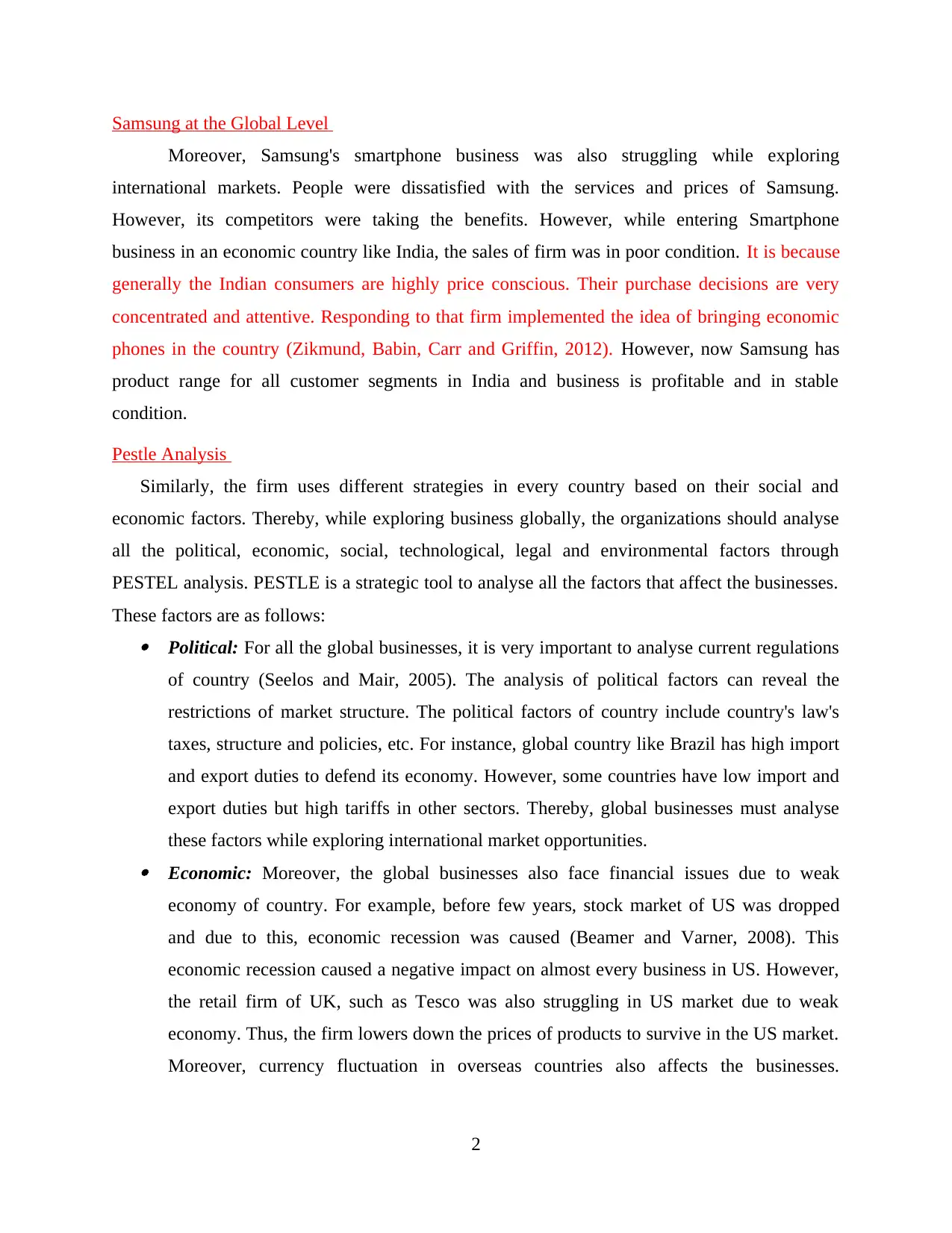
Samsung at the Global Level
Moreover, Samsung's smartphone business was also struggling while exploring
international markets. People were dissatisfied with the services and prices of Samsung.
However, its competitors were taking the benefits. However, while entering Smartphone
business in an economic country like India, the sales of firm was in poor condition. It is because
generally the Indian consumers are highly price conscious. Their purchase decisions are very
concentrated and attentive. Responding to that firm implemented the idea of bringing economic
phones in the country (Zikmund, Babin, Carr and Griffin, 2012). However, now Samsung has
product range for all customer segments in India and business is profitable and in stable
condition.
Pestle Analysis
Similarly, the firm uses different strategies in every country based on their social and
economic factors. Thereby, while exploring business globally, the organizations should analyse
all the political, economic, social, technological, legal and environmental factors through
PESTEL analysis. PESTLE is a strategic tool to analyse all the factors that affect the businesses.
These factors are as follows: Political: For all the global businesses, it is very important to analyse current regulations
of country (Seelos and Mair, 2005). The analysis of political factors can reveal the
restrictions of market structure. The political factors of country include country's law's
taxes, structure and policies, etc. For instance, global country like Brazil has high import
and export duties to defend its economy. However, some countries have low import and
export duties but high tariffs in other sectors. Thereby, global businesses must analyse
these factors while exploring international market opportunities. Economic: Moreover, the global businesses also face financial issues due to weak
economy of country. For example, before few years, stock market of US was dropped
and due to this, economic recession was caused (Beamer and Varner, 2008). This
economic recession caused a negative impact on almost every business in US. However,
the retail firm of UK, such as Tesco was also struggling in US market due to weak
economy. Thus, the firm lowers down the prices of products to survive in the US market.
Moreover, currency fluctuation in overseas countries also affects the businesses.
2
Moreover, Samsung's smartphone business was also struggling while exploring
international markets. People were dissatisfied with the services and prices of Samsung.
However, its competitors were taking the benefits. However, while entering Smartphone
business in an economic country like India, the sales of firm was in poor condition. It is because
generally the Indian consumers are highly price conscious. Their purchase decisions are very
concentrated and attentive. Responding to that firm implemented the idea of bringing economic
phones in the country (Zikmund, Babin, Carr and Griffin, 2012). However, now Samsung has
product range for all customer segments in India and business is profitable and in stable
condition.
Pestle Analysis
Similarly, the firm uses different strategies in every country based on their social and
economic factors. Thereby, while exploring business globally, the organizations should analyse
all the political, economic, social, technological, legal and environmental factors through
PESTEL analysis. PESTLE is a strategic tool to analyse all the factors that affect the businesses.
These factors are as follows: Political: For all the global businesses, it is very important to analyse current regulations
of country (Seelos and Mair, 2005). The analysis of political factors can reveal the
restrictions of market structure. The political factors of country include country's law's
taxes, structure and policies, etc. For instance, global country like Brazil has high import
and export duties to defend its economy. However, some countries have low import and
export duties but high tariffs in other sectors. Thereby, global businesses must analyse
these factors while exploring international market opportunities. Economic: Moreover, the global businesses also face financial issues due to weak
economy of country. For example, before few years, stock market of US was dropped
and due to this, economic recession was caused (Beamer and Varner, 2008). This
economic recession caused a negative impact on almost every business in US. However,
the retail firm of UK, such as Tesco was also struggling in US market due to weak
economy. Thus, the firm lowers down the prices of products to survive in the US market.
Moreover, currency fluctuation in overseas countries also affects the businesses.
2
Paraphrase This Document
Need a fresh take? Get an instant paraphrase of this document with our AI Paraphraser
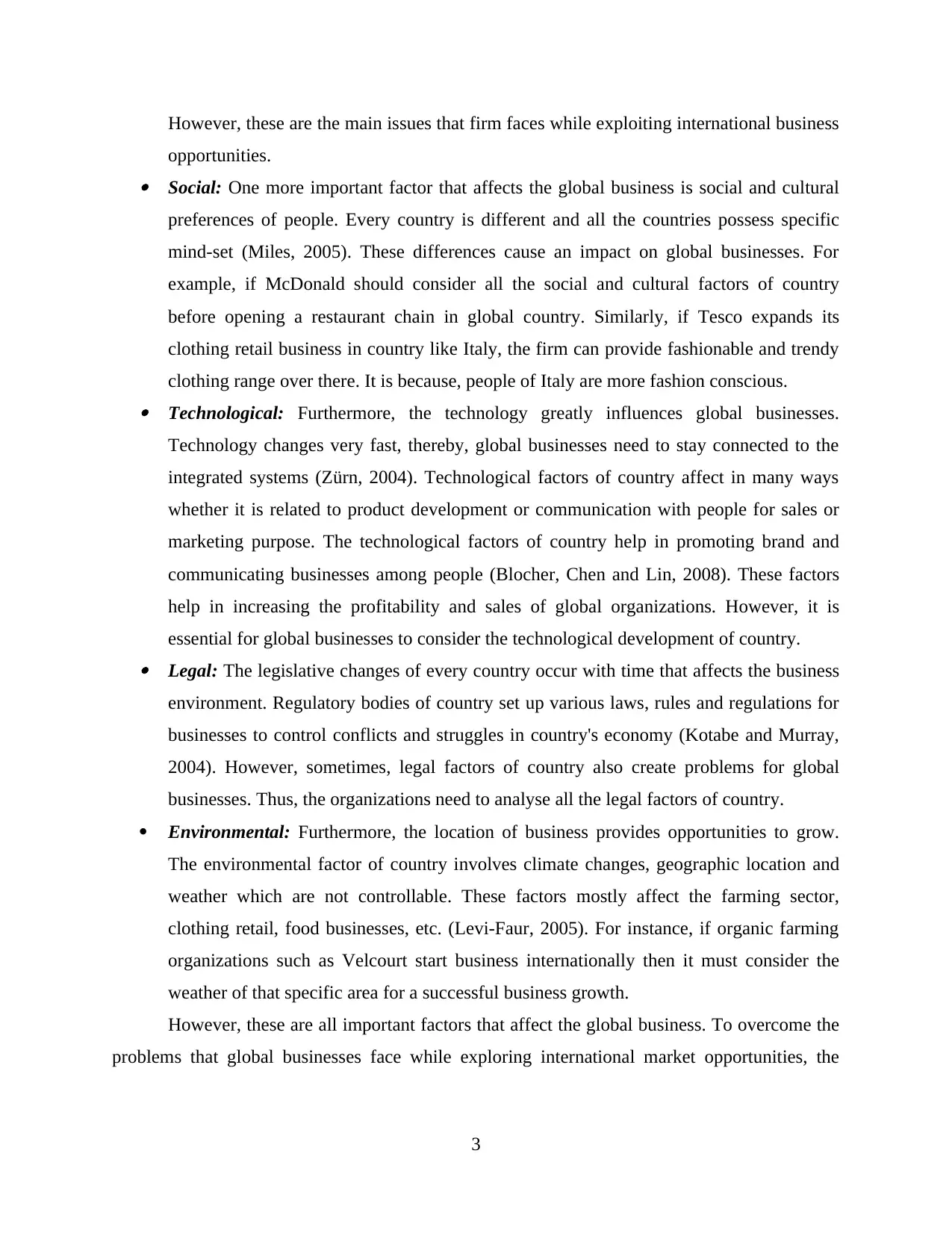
However, these are the main issues that firm faces while exploiting international business
opportunities. Social: One more important factor that affects the global business is social and cultural
preferences of people. Every country is different and all the countries possess specific
mind-set (Miles, 2005). These differences cause an impact on global businesses. For
example, if McDonald should consider all the social and cultural factors of country
before opening a restaurant chain in global country. Similarly, if Tesco expands its
clothing retail business in country like Italy, the firm can provide fashionable and trendy
clothing range over there. It is because, people of Italy are more fashion conscious. Technological: Furthermore, the technology greatly influences global businesses.
Technology changes very fast, thereby, global businesses need to stay connected to the
integrated systems (Zürn, 2004). Technological factors of country affect in many ways
whether it is related to product development or communication with people for sales or
marketing purpose. The technological factors of country help in promoting brand and
communicating businesses among people (Blocher, Chen and Lin, 2008). These factors
help in increasing the profitability and sales of global organizations. However, it is
essential for global businesses to consider the technological development of country. Legal: The legislative changes of every country occur with time that affects the business
environment. Regulatory bodies of country set up various laws, rules and regulations for
businesses to control conflicts and struggles in country's economy (Kotabe and Murray,
2004). However, sometimes, legal factors of country also create problems for global
businesses. Thus, the organizations need to analyse all the legal factors of country.
Environmental: Furthermore, the location of business provides opportunities to grow.
The environmental factor of country involves climate changes, geographic location and
weather which are not controllable. These factors mostly affect the farming sector,
clothing retail, food businesses, etc. (Levi-Faur, 2005). For instance, if organic farming
organizations such as Velcourt start business internationally then it must consider the
weather of that specific area for a successful business growth.
However, these are all important factors that affect the global business. To overcome the
problems that global businesses face while exploring international market opportunities, the
3
opportunities. Social: One more important factor that affects the global business is social and cultural
preferences of people. Every country is different and all the countries possess specific
mind-set (Miles, 2005). These differences cause an impact on global businesses. For
example, if McDonald should consider all the social and cultural factors of country
before opening a restaurant chain in global country. Similarly, if Tesco expands its
clothing retail business in country like Italy, the firm can provide fashionable and trendy
clothing range over there. It is because, people of Italy are more fashion conscious. Technological: Furthermore, the technology greatly influences global businesses.
Technology changes very fast, thereby, global businesses need to stay connected to the
integrated systems (Zürn, 2004). Technological factors of country affect in many ways
whether it is related to product development or communication with people for sales or
marketing purpose. The technological factors of country help in promoting brand and
communicating businesses among people (Blocher, Chen and Lin, 2008). These factors
help in increasing the profitability and sales of global organizations. However, it is
essential for global businesses to consider the technological development of country. Legal: The legislative changes of every country occur with time that affects the business
environment. Regulatory bodies of country set up various laws, rules and regulations for
businesses to control conflicts and struggles in country's economy (Kotabe and Murray,
2004). However, sometimes, legal factors of country also create problems for global
businesses. Thus, the organizations need to analyse all the legal factors of country.
Environmental: Furthermore, the location of business provides opportunities to grow.
The environmental factor of country involves climate changes, geographic location and
weather which are not controllable. These factors mostly affect the farming sector,
clothing retail, food businesses, etc. (Levi-Faur, 2005). For instance, if organic farming
organizations such as Velcourt start business internationally then it must consider the
weather of that specific area for a successful business growth.
However, these are all important factors that affect the global business. To overcome the
problems that global businesses face while exploring international market opportunities, the
3
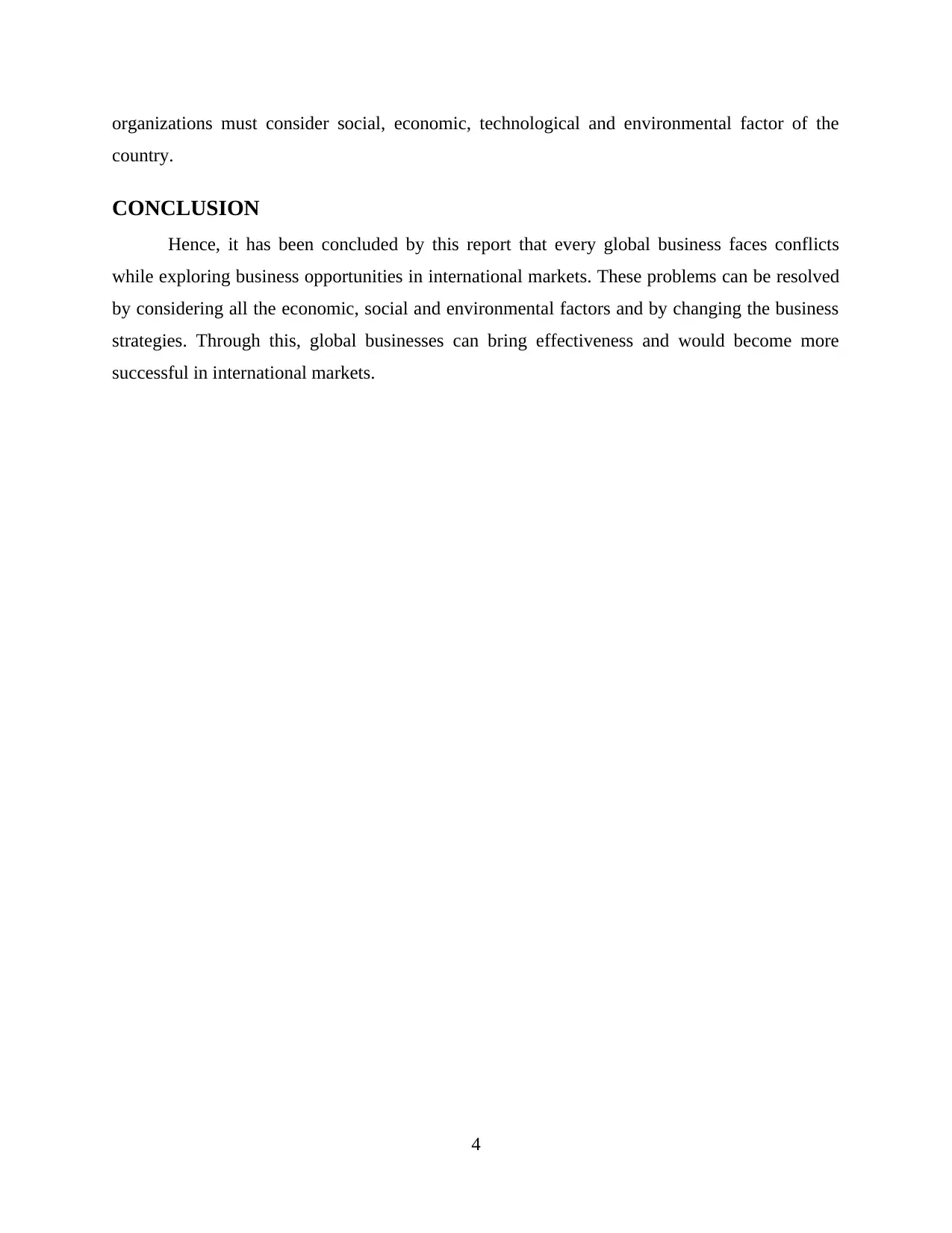
organizations must consider social, economic, technological and environmental factor of the
country.
CONCLUSION
Hence, it has been concluded by this report that every global business faces conflicts
while exploring business opportunities in international markets. These problems can be resolved
by considering all the economic, social and environmental factors and by changing the business
strategies. Through this, global businesses can bring effectiveness and would become more
successful in international markets.
4
country.
CONCLUSION
Hence, it has been concluded by this report that every global business faces conflicts
while exploring business opportunities in international markets. These problems can be resolved
by considering all the economic, social and environmental factors and by changing the business
strategies. Through this, global businesses can bring effectiveness and would become more
successful in international markets.
4
⊘ This is a preview!⊘
Do you want full access?
Subscribe today to unlock all pages.

Trusted by 1+ million students worldwide
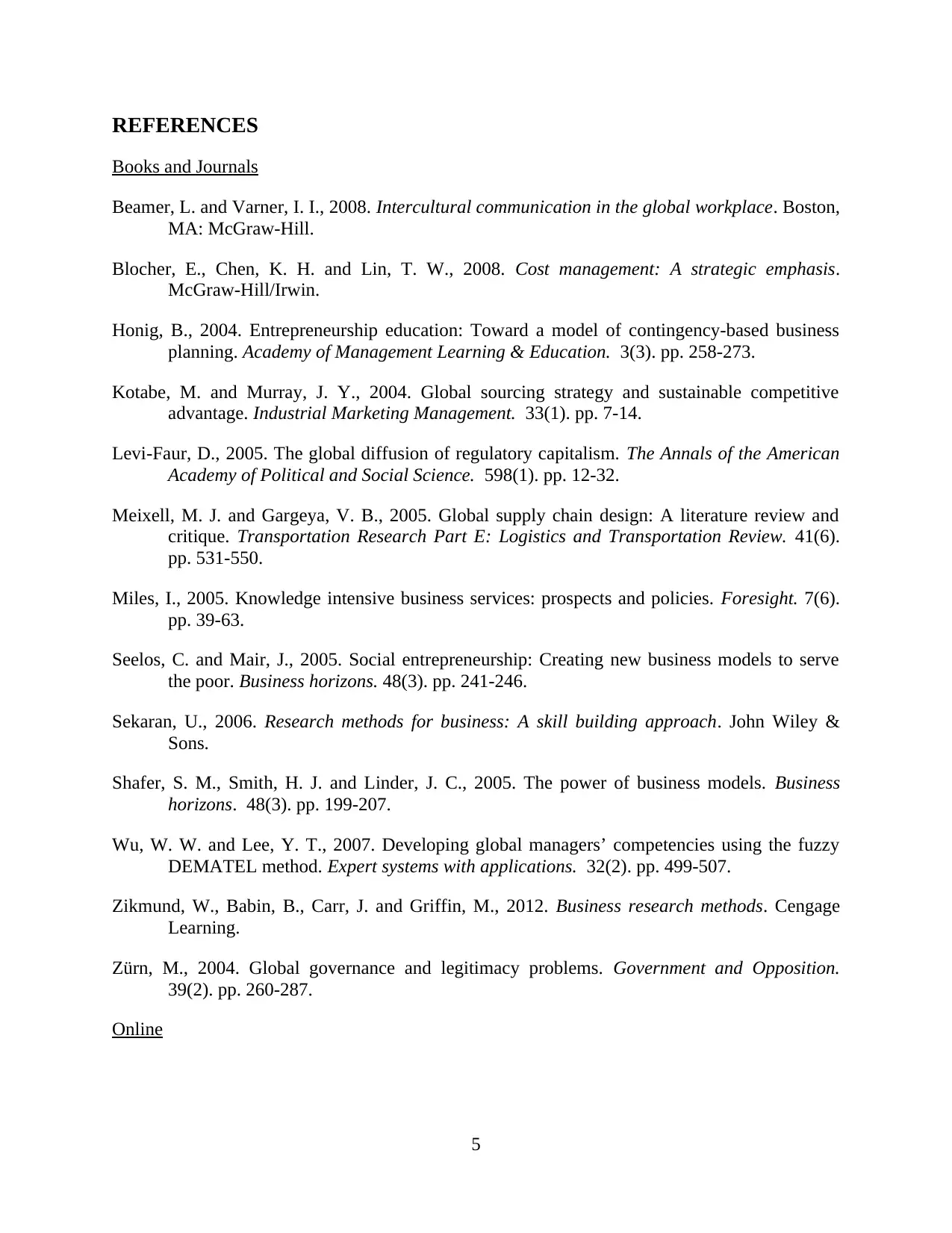
REFERENCES
Books and Journals
Beamer, L. and Varner, I. I., 2008. Intercultural communication in the global workplace. Boston,
MA: McGraw-Hill.
Blocher, E., Chen, K. H. and Lin, T. W., 2008. Cost management: A strategic emphasis.
McGraw-Hill/Irwin.
Honig, B., 2004. Entrepreneurship education: Toward a model of contingency-based business
planning. Academy of Management Learning & Education. 3(3). pp. 258-273.
Kotabe, M. and Murray, J. Y., 2004. Global sourcing strategy and sustainable competitive
advantage. Industrial Marketing Management. 33(1). pp. 7-14.
Levi-Faur, D., 2005. The global diffusion of regulatory capitalism. The Annals of the American
Academy of Political and Social Science. 598(1). pp. 12-32.
Meixell, M. J. and Gargeya, V. B., 2005. Global supply chain design: A literature review and
critique. Transportation Research Part E: Logistics and Transportation Review. 41(6).
pp. 531-550.
Miles, I., 2005. Knowledge intensive business services: prospects and policies. Foresight. 7(6).
pp. 39-63.
Seelos, C. and Mair, J., 2005. Social entrepreneurship: Creating new business models to serve
the poor. Business horizons. 48(3). pp. 241-246.
Sekaran, U., 2006. Research methods for business: A skill building approach. John Wiley &
Sons.
Shafer, S. M., Smith, H. J. and Linder, J. C., 2005. The power of business models. Business
horizons. 48(3). pp. 199-207.
Wu, W. W. and Lee, Y. T., 2007. Developing global managers’ competencies using the fuzzy
DEMATEL method. Expert systems with applications. 32(2). pp. 499-507.
Zikmund, W., Babin, B., Carr, J. and Griffin, M., 2012. Business research methods. Cengage
Learning.
Zürn, M., 2004. Global governance and legitimacy problems. Government and Opposition.
39(2). pp. 260-287.
Online
5
Books and Journals
Beamer, L. and Varner, I. I., 2008. Intercultural communication in the global workplace. Boston,
MA: McGraw-Hill.
Blocher, E., Chen, K. H. and Lin, T. W., 2008. Cost management: A strategic emphasis.
McGraw-Hill/Irwin.
Honig, B., 2004. Entrepreneurship education: Toward a model of contingency-based business
planning. Academy of Management Learning & Education. 3(3). pp. 258-273.
Kotabe, M. and Murray, J. Y., 2004. Global sourcing strategy and sustainable competitive
advantage. Industrial Marketing Management. 33(1). pp. 7-14.
Levi-Faur, D., 2005. The global diffusion of regulatory capitalism. The Annals of the American
Academy of Political and Social Science. 598(1). pp. 12-32.
Meixell, M. J. and Gargeya, V. B., 2005. Global supply chain design: A literature review and
critique. Transportation Research Part E: Logistics and Transportation Review. 41(6).
pp. 531-550.
Miles, I., 2005. Knowledge intensive business services: prospects and policies. Foresight. 7(6).
pp. 39-63.
Seelos, C. and Mair, J., 2005. Social entrepreneurship: Creating new business models to serve
the poor. Business horizons. 48(3). pp. 241-246.
Sekaran, U., 2006. Research methods for business: A skill building approach. John Wiley &
Sons.
Shafer, S. M., Smith, H. J. and Linder, J. C., 2005. The power of business models. Business
horizons. 48(3). pp. 199-207.
Wu, W. W. and Lee, Y. T., 2007. Developing global managers’ competencies using the fuzzy
DEMATEL method. Expert systems with applications. 32(2). pp. 499-507.
Zikmund, W., Babin, B., Carr, J. and Griffin, M., 2012. Business research methods. Cengage
Learning.
Zürn, M., 2004. Global governance and legitimacy problems. Government and Opposition.
39(2). pp. 260-287.
Online
5
Paraphrase This Document
Need a fresh take? Get an instant paraphrase of this document with our AI Paraphraser
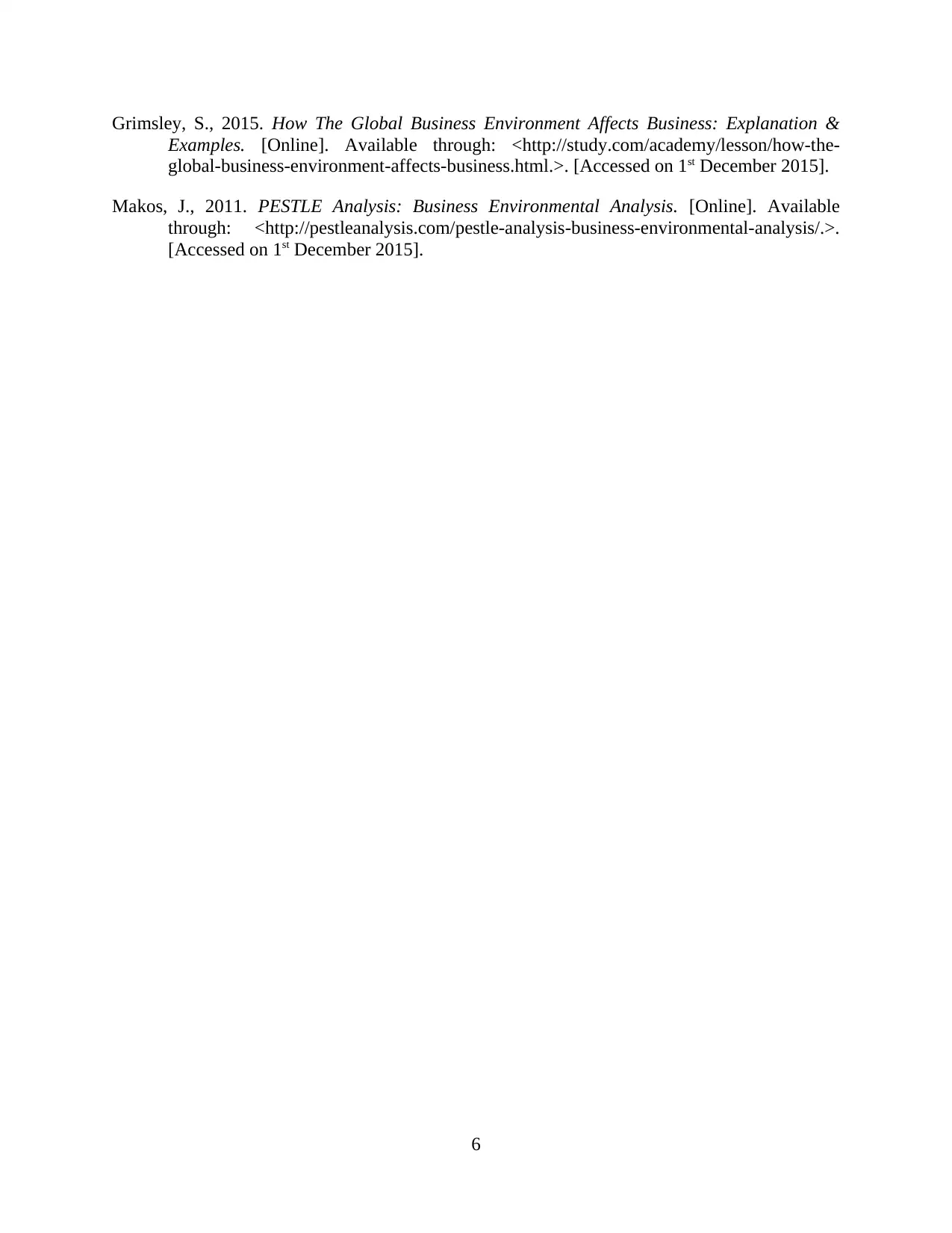
Grimsley, S., 2015. How The Global Business Environment Affects Business: Explanation &
Examples. [Online]. Available through: <http://study.com/academy/lesson/how-the-
global-business-environment-affects-business.html.>. [Accessed on 1st December 2015].
Makos, J., 2011. PESTLE Analysis: Business Environmental Analysis. [Online]. Available
through: <http://pestleanalysis.com/pestle-analysis-business-environmental-analysis/.>.
[Accessed on 1st December 2015].
6
Examples. [Online]. Available through: <http://study.com/academy/lesson/how-the-
global-business-environment-affects-business.html.>. [Accessed on 1st December 2015].
Makos, J., 2011. PESTLE Analysis: Business Environmental Analysis. [Online]. Available
through: <http://pestleanalysis.com/pestle-analysis-business-environmental-analysis/.>.
[Accessed on 1st December 2015].
6
1 out of 8
Related Documents
Your All-in-One AI-Powered Toolkit for Academic Success.
+13062052269
info@desklib.com
Available 24*7 on WhatsApp / Email
![[object Object]](/_next/static/media/star-bottom.7253800d.svg)
Unlock your academic potential
Copyright © 2020–2025 A2Z Services. All Rights Reserved. Developed and managed by ZUCOL.




